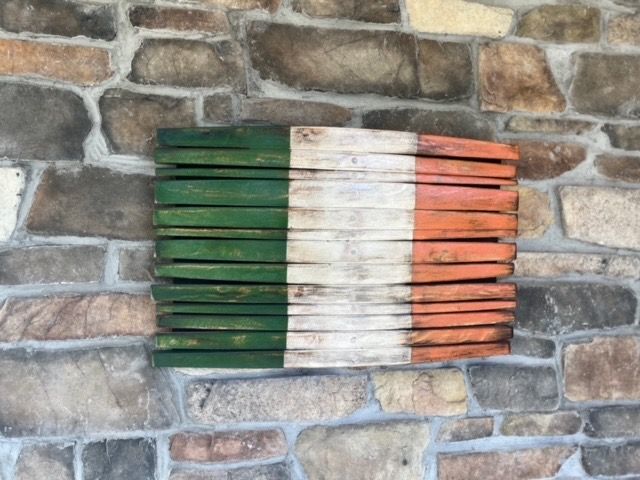[caption id="attachment_67095" align="aligncenter" width="600" caption="Declan Burke, the editor of "Down These Green Streets," addresses the reception for his fellow Irish crime writers at the Mysterious Book Shop in Downtown Manhattan."]
Professor John Waters said if his students should have occasion to see him bleary-eyed, it's likely because he stayed up to read the latest by John Connolly or Declan Hughes.
He was formally closing the day-long symposium "Down These Green Streets" at Glucksman Ireland House last Saturday and also introducing the anthology of the same name, edited by another of the new wave of Irish crime writers, Declan Burke.
Also among the participants' books launched at the symposium was "Lost Souls" by Stuart Neville, whose "Ghosts of Belfast" was a big hit with American critics last year.
"At first I thought I didn't belong here," American writer Michael Connelly says in the foreword to "Down These Green Streets," despite his being entirely of Irish descent. "But then I started reading the stories and the essays and I came to realize there is a universal language in the crime story."
Retired NYPD homicide detective John Culley and his wife are fans of Connelly, whose work is set mainly in Los Angeles, and they'd been curious about his Irish-born equivalents.
"I was fascinated to hear how they all became crime-writers," said the former cop who lives in Riverdale in the Bronx.
In a "Down These Green Streets" essay, Colin Bateman tells how as a punk music-obsessed 17-year-old he got a full-time job writing for the County Down Spectator. When he moved up the editorial ladder, he wrote a satiric column about his hometown. People still stop him in the street to discuss it "and sometimes they have no idea that I've gone on to write books."
Bateman has 20 to his name and several screenwriting credits, and yet isn't published in the United States. At the reception at the Mysterious Book Shop for the writers on Friday evening, Bateman told the Echo that that apparently has something to do with his humor not traveling.
Eleanor Culley, however, was impressed with the level of wit displayed by all of the writers at Glucksman. "I was amazed at how fast they were with the comebacks," she said.
"It was a very spirited discussion," said Jim Cagney, of Woodside, Queens, who attended with his wife. "That's what made it interesting."
"It couldn't have gone to a better event," said playwright Joe Goodrich. He and his partner, writer and actor Honor Molloy, had been at a similar panel on mystery writing at the Brooklyn Book Festival the previous weekend.
"This was much livelier," Molloy said
It helped that at the plenary session Professor Ian Campbell Ross of Trinity College Dublin invited the writers to speak to the themes of sin, crime and morality.
Said Alex Barclay, one of the two women writers on the panel: "Crime fiction is very interested in justice."
Connolly, the Dubliner who sets his work in Maine, added: "Crime writing is essentially hopeful. It's unsatisfying if the guilty are not punished."
Hughes said that he might have taken a "smart alecky" approach if he'd written novels when he was a young man. He became an author, though, only after the death of his father and the birth of his two children. "The stakes were suddenly much higher," he recalled. "I somehow had to honor that in the books."
He was critical of the nihilism in the work of writers such as David Peace and James Ellroy.
There was criticism from the panel, too, for James Patterson's books.
Peter Quinn, representing Irish-American crime writing on the panel, said there seemed to be an "arms race" when it came explicitness in depicting violence.
Connolly reported there was a certain type of reader who liked gruesome violence but disapproved of the perpetrator swearing while committing his crime or having a sex life.
A few writers said that their novels have gotten less explicit over time and they found it was better to let readers use their imaginations. "You don't have to be violent and exploitative," said one of them, Arlene Hunt.
Using the example of the Nazi period, Quinn and Connolly discussed the extent to which ordinary people are aware that they are committing evil or going along with it. "They have a moral sense and when they violate it, they know it," Quinn argued.
There was some disagreement on what Quinn introduced as the "elephant in the room," the digital revolution that was threatening the economic model in publishing. Some of his fellow authors were more optimistic generally, and argued that the huge success of the Harry Potter series shows at least that more young people are reading than before.
When asked if there were rules, Quinn said there are none "other than it is a satisfying story and that people find it convincing."
Burke, however, said that crime writers knew that they were working with a framework. "There has to be redemption," he said. "The reader must get some sort of payback."
Audience members seem to have gotten payback on Saturday. "Usually authors aren't that honest," said Brigid Cagney of Woodside. "They spoke their minds."
Graduate student Joe Long, who helped organize the event with Waters, declared the day a success: "I was very proud of the fact that NYU, one of the major universities in the country, thought this subject was worthy from an intellectual point of view of a one-day symposium."










